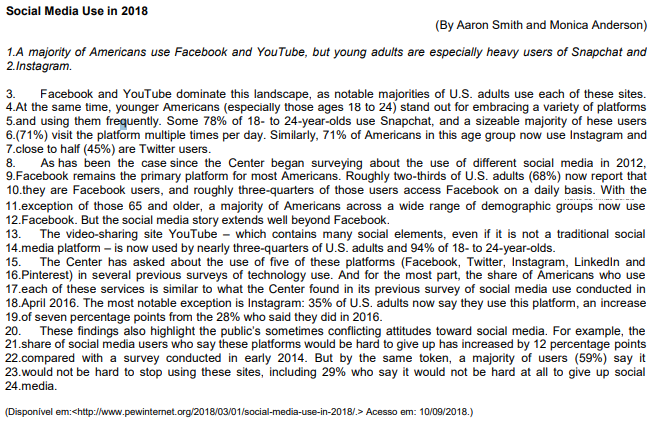Mark the alternative which contains a modal verb which expresses permission:












EVANS, Stephen. Disponível em: <www.bbc.co.uk/worldservice/learningenglish/language/wordsinthenews/2011/05/110518_witn_electric_cars_page.shtml>. Acesso em: 2 jun. 2011.


MIRCHANDANI, Rajesh. Polar bears will be protected in Alaska. Disponível em:<<www.bbc.co.uk/worldservice/learningenglish/language/wordsinthenews/2010/11/100929_with_polarbears_page.shtml>. Acesso em: 2 dez. 2010.


TEXT C

(The Economist, May 22nd, 2010)


Read text 1 to answer question.
Text 1

Newsweek. Available in
http://www.newsweek.com/photo/2008/12/18/cartoonsnewsweeks-best-of-2008.html.
Access on: May 03, 2011.
TEXTO 01

Learn ‘n’ go
How quickly can people learn new skills?
Jan 25th 2014 – from the print edition
In 2012, Erik Brynjolfsson and Andrew McAfee took a ride in one of Google’s driverless cars. The car’s performance, they report, was flawless, boring and, above all, “weird”. Only a few years earlier, “We were sure that computers would not be able to drive cars.” Only humans, they thought, could make sense of the countless, shifting patterns of driving a car – with oncoming1 traffic, changing lights and wayward2 jaywalkers3 .
Machines have mastered driving. And not just driving. In ways that are only now becoming apparent, the authors argue, machines can forecast home prices, design beer bottles, teach at universities, grade exams and do countless other things better and more cheaply than humans. (…)
This will have one principal good consequence, and one bad. The good is bounty4 . Households will spend less on groceries, utilities and clothing; the deaf will be able to hear, the blind to see. The bad is spread5 . The gap is growing between the lucky few whose abilities and skills are enhanced6 by technology, and the far more numerous middle-skilled people competing for the remaining7 jobs that machines cannot do, such as folding towels and waiting at tables. (…) People should develop skills that complement, rather than compete with computers, such as idea generation and complex communication. (…)
